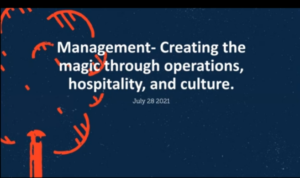08.05.21
8 Tips for Restaurant Industry Management to Create Magic Through Operations, Hospitality, and Culture
Tammy Allen, Director | Marketing & Programs, The NIIC

Any restaurant that has survived the recent pandemic has learned to restructure and reimagine its management model. Perhaps no one has done that better than Justin Lance, Regional Director of Operations at City Barbecue. With over 25 years of experience in the restaurant industry, Justin has worked all over the nation.
He says he works in the people business, not the food industry or the barbeque business. Here, he offers eight tips to create a management model for employee retention and opportunities for growth.
Tip #1: Create a Unique Culture – “When I talk about culture, it’s all about developing people and helping them get from where they are to where they want to be,” he said. While many companies may express cultural ambitions, sometimes the intended culture just doesn’t come alive. According to Justin, it comes down to defining the culture, living the culture, and empowering the team to make decisions based on clear cultural guidelines and behaviors.
“Business culture refers to a set of behavioral procedural norms that can be observed within a company,” he said. “The policies, the procedures, the ethics, the values and the behaviors and attitudes all have to be part of that code of conduct, and it all has to align.”
One of those cultural values at City Barbeque, for example, is generosity. “It really started with Rick Malir when he started the company. He’s always been a very generous person.” Rick is so generous that at the end of City Barbeque’s first year, he ended up paying out $80,000 in bonuses — all the profits of that first year. “Rick didn’t take a paycheck that year,” said Justin, “but that’s our culture.”
That culture continues today as City Barbeque pushes to reward and recognize team members. “One of my favorite things to do is walk into a joint and give everybody in the building a raise just because they’re doing what they’re supposed to be doing,” said Justin.
A related cultural value at City Barbeque is reflected in its purpose, which is to serve and create happiness. According to Justin, that value starts with the staff, not guests. “My job as a regional director of operations is to serve and create happiness,” he said. It’s the same for the market leader directors and general managers as they connect with the hourly employees to make sure they’re happy.
Tip #2: Invest in the Best – Justin points out that just because a restaurant is small doesn’t mean it can’t set standards or achieve best practices. For example, City Barbeque has an automated line check with a probe and a tablet. “That probe sends the temperature of the food to the tablet and records it, and all of our coolers have equipment in them that monitor the temperature.” That way, they can check the temperature of food in real-time.
“Chick-fil-A came to us and asked about this system and now they use it. That, to me, is really setting the standard for others to follow,” said Justin. “After all, why can’t we have the best equipment, the best technology, the best people, the best pay?”
Tip #3: Maintain Safety Without Sacrificing Quality – Everyone in the restaurant industry faced this challenge last year during the pandemic. “Safety first” became a well-known mantra in the business. “It was a step-by-step process of making sure our team was safe, our guests were safe, our food was safe, and our building was safe. Safety first is our number one value,” he said.
Of course, without quality, all the safety measures in the world wouldn’t make a difference. “Delivering quality without sacrifice is the challenge as you grow as a company,” said Justin. “We go as far west as Madison, Wis., and into Cleveland, OH, and they all have to have the same brisket sandwich. The best score you can get in barbecue is a nine if you’re at a barbecue competition, and that’s what we’re going for daily.”
Tip #4: Develop Backyard Hospitality – “You have to be a positive member of the community,” said Justin. It’s a value City Barbeque lived during the pandemic, donating over 45,000 meals to frontline workers. “Our guests were part of that. They had the option to donate five dollars to help support that cause when they checked out. We utilized our catering team to deliver these meals to hospitals and other frontline workers.”
Food banks are another great way for restaurants to contribute to the community, as is giving back to schools and other organizations through fundraising. “Each of our locations gives about $10,000 – $15,000 a year in cash to non-profit organizations who come in and want to do fundraisers,” he said.
Tip #5: Empower Employees – “We love that our employees have blue hair and tattoos,” said Justin. Yet, City Barbeque takes that empowerment a step further. “Our employees have what we call a hundred dollar bill rule, where they can fix anything for a guest, up to a hundred dollars. So, if guests came in and weren’t happy with their ribs, for example, employees can say, ‘Well, let me get you a new rib order, and here’s a coupon for some ribs the next time as well.'” This includes people who are doing dishes in the back. They love doing it.
Tip #6: Improve a Little More Each Day – “Last year more than ever,” said Justin, “failure wasn’t an option.” That’s what he especially likes about the restaurant industry. “We put our shoulder behind something in this industry, and we will get through it,” he said. In fact, the restaurant’s culture helps people buy into the vision, although he’s quick to admit that culture drifts. “Culture can evolve,” he said. “It has to be redefined and updated. We must always cast a vision and correct cultural behaviors.”
During the pandemic, City Barbeque had to shift most of its business to take out orders when it came to operations. “We had to get good at curbside immediately,” he said. That meant adjusting technology and making tough decisions. “We found out what we could do as a business was changing the menu and the hours of operation,” he said.
Tip #7: Make Meaningful Partnerships – “One of the great things about developing our curbside service was our partnership with Flybuy,” said Justin. “That technology allowed us to reduce our delivery time to the car. We’ve been able to get down to around a minute average time from the time the guest pulled into the parking lot until they got their food. A lot of times, we were out in the parking lot with the food before the guest even pulled in.”
Tip #8: Solve Staffing – “I honestly believe employee retention is the silver bullet in all the brands and companies that I’ve worked for,” said Justin. “Now, more than ever, that retention issue has gotten a lot harder.” Some challenges include maintaining a competitive pay rate and creating an environment where people want to work. “People want to have fun,” said Justin. “You have to create an environment where someone wants to stay and work for you because of what you’re providing and the way you treat them.”
Get creative with benefits. “We’ve got to think differently,” he said. One way to do that is hiring temporary employees to cover gaps so restaurants can keep the doors open. “I know for a fact that’s going to be part of our budgeting process for 2022,” Justin said.
Grow existing talent. “Our assistant managers have grown internally and worked their way up,” he said. “We have an opening trainer who travels around and opens restaurants. That person will be a market leader for us in five years.”
Look beyond the resume. “You’re looking for the attitude,” he said. “We can teach skills in a lot of ways, but we’re looking for somebody who wants to earn a high wage by working hard. We get dirty. We want someone who wants to be part of something special — somebody that’s excited to work for us.”
In summary
Restaurants daily navigate challenges. This includes creative problem solving, like creating a unique culture, investing in the best, maintaining safety and quality, developing backyard hospitality, empowering employees, focusing on continual improvement, creating meaningful partnerships, and solving staffing problems.
About Justin Lance, City Barbeque
Lance is a successful role model with over 25 years of experience in the restaurant industry. His tenure includes multiple promotions at high-growth brands such as Bahama Breeze, Don Pablo’s, and City Barbeque. Over the years, he and his teams have produced a talent pipeline, leading to internal promotions for teammates at the GM, department director, multi-unit leader, and new store opening levels. He excels in sales growth, people development, and building relationships with the guests in his restaurants.
This blog is based on The NIIC Restaurant Revitalization Speaker Series, focused on five key areas: Mayhem, Miracles, Marketing, Menu, and Management. This blog focuses on Management. Click here for a replay of the event.

